Reflecting on the Critical Intersections Webinar
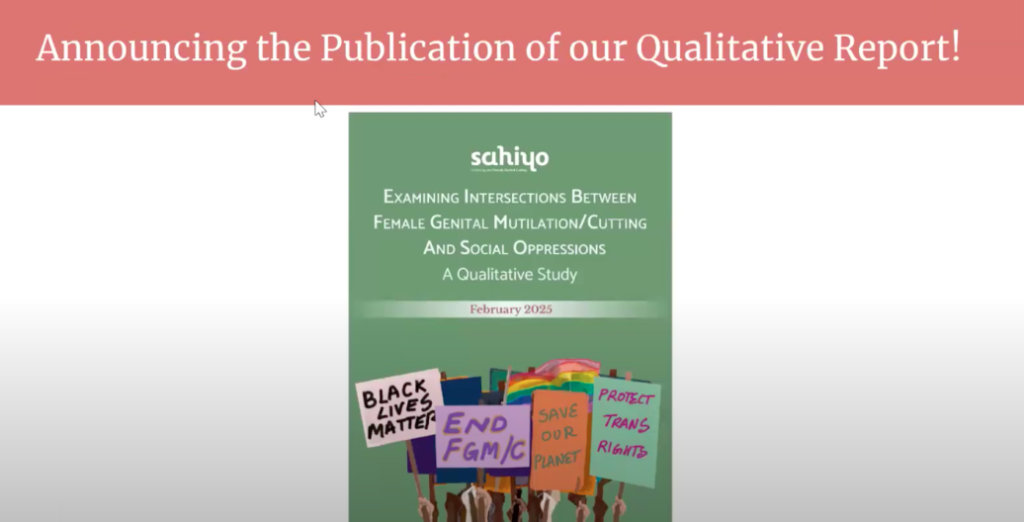
On February 27th, Sahiyo’s Research Coordinator Rachel Wine, and Executive Director Mariya Taher led the webinar, “Intersectional Approaches Strengthen Alliances and Build Movements to End FGM/C,” to announce the publication of the third and final report for Sahiyo’s Critical Intersections Research Project project, Examining Intersections Between Female Genital Mutilation/Cutting and Social Oppressions: A Qualitative Study. The event explored Sahiyo’s Critical Intersections Research Project from its inception in 2021 to the present in 2025. Mariya shared how a 2021 webinar focused on how racism impacted the movement to end FGM/C inspired the Critical Intersections research project. While, Rachel gave an overview of the findings from our first two reports: Examining the Current State of Critical Intersections: Female Genital Mutilation/ Cutting and Social Oppressions Examining Intersections Between Female Genital Mutilation/Cutting and Social Oppressions A Mixed Methods Study Throughout the course of this three-year project, many researchers supported the work and they too shared their experiences during the webinar with partner researcher Naquia highlighting the key intersections found in this newest report: race/racism, LGBTQIA+ issues, gender inequities, and religious discrimination. Another partner researcher Jessica Puri and Project Advisors Aarefa Johari and Saza Faradilla spoke about their experiences with intersectionality in their own work surrounding FGM/C, and how the findings from the report can strengthen the movement to end FGM/C. In specific, Aarefa discussed how religion intersects with FGM/C in India, and Saza touched on the benefits of framing FGM/C through the lens of gender to recognize FGM/C is a form of gender-based violence. Naquia spoke to the framing aspect and asked readers of the report to consider the importance of language and the complex nature of FGM/C when engaging in activism to end it Rachel ended the webinar, by uplifting the four recommendations from the report: To coordinate with social service sectors across various social justice issues Improve language and framing of FGM/C Increase education on how FGM/C is intersectional Implement more diverse and equitable approaches to data collection, analysis, and dissemination Each recommendation was accompanied by a suggested action item for those in the FGM/C sphere to help them incorporate intersectionality into their approaches and advocacy. As the anti-FGM/C field looks to the future of their work, the Critical Intersections Research Project makes it clear that intersectional collaboration is crucial to creating social change and ending this human rights violation. Watch the webinar recording here. Learn more about the Critical Intersections Research Project here.
Sahiyo research uplifts how intersectionality impacts the movement to end FGM/C this February 6th
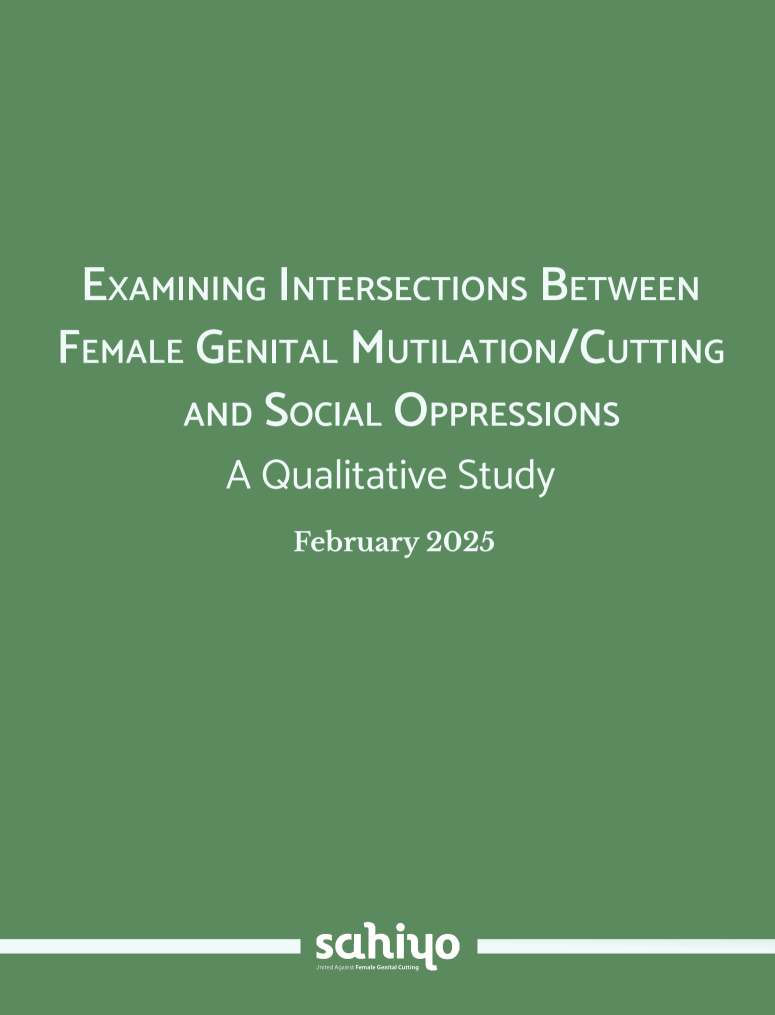
In recognition of Feb 6th, International Day of Zero Tolerance to End FGM/C, and this year’s theme “Stepping up the Pace: Strengthening Alliances and Building Movements to End FGM,” our upcoming publication of Sahiyo’s third and final Critical Intersections Research Project report Examining Intersections Between Female Genital Mutilation/Cutting and Social Oppressions: A Qualitative Study could not be more timely. Our report’s findings reinforce the vital importance of recognizing intersectional identities and oppressions, as well as prioritizing the need to build cross-movement collaboration to strengthen the movement to end FGM/C. Overall, our research reveals through extensive data and testimonials that we are stronger when we work together, contrasting the harmful and discriminatory rhetoric coming from the Trump Administration. Expanding on the findings of our first two reports, this body of work includes insights derived from in-depth interviews conducted with 29 key experts across various social justice fields. The interviews were conducted across multiple geographic regions virtually via Zoom from November 2022 to February 2023. Two clear themes emerged: Intersectionality and Cross Collaboration. The report addresses the following topics within these two themes: Intersections between FGM/C and Race, LGBTQIA+, Religion, and Gender. Challenges and Opportunities to Cross Collaboration. From these findings, four recommendations were derived to address FGM/C: Coordinate with social service sectors across various social justice issues to improve support and resources for survivors. Improve language and framing of FGM/C to limit racialization and/or exclusion of marginalized communities in terms of who is impacted by FGM/C. Increase education on how FGM/C is intersectional within anti-FGM/C organizations, as well as across different movements/sectors. Implement more diverse and equitable approaches to data collection, analysis and dissemination that include input from a diverse array of stakeholders. Don’t miss our webinar, Intersectional Approaches Strengthen Alliances and Build Movements to End FGM/C, to learn more about the three-year project. Date/Time: February 27 @ 10-11:30 AM ET Registration link: https://bit.ly/FGMCAlliances Description: This webinar, which is both a culmination of the Critical Intersections Research Project and a charted path forward, will loop in key players from throughout the project to share their experiences and explore key findings that emphasize how intersectional approaches in ending FGM/C, including building alliances and partnerships with other social justice movements, strengthens our overall work to end FGM/C. Speakers: Aarefa Johari is a journalist and feminist activist based in Mumbai, India. She has been advocating for an end to Female Genital Cutting since 2012 and is a co-founder of Sahiyo, an organisation working to end FGC. Saza Faradilla (she/they) is a co-founder of End Female Genital Cutting Singapore, which envisions a world where the practice of FGC is obsolete. She raises awareness on social media and on-the-ground, and participates in local and international lobbying at the United Nations to bring attention to the fact that FGC is a pressing concern in Asia. Equally important, she calls for a culturally-contextual and intersectional feminist approach when dealing with sexual and gender based violence across diverse Asian communities. Jessica Puri is an Adjunct Professor of Public Health and founder of The Parable Lab. Nicknamed a Creative Academic, she enjoys the pursuit of knowledge and rest through creative expression and storytelling. Naquia Unwala is currently a medical student at Georgetown University School of Medicine. She is also a Research Associate at Cornell University where she studies homelessness, public health disasters, and urban politics. Naquia is a volunteer at Sahiyo, and has helped with leading qualitative analysis of the Critical Intersections Research Project. Critical Intersections: Since 2021, through our survivor and advocate-led Critical Intersections Research Project, Sahiyo has sought to understand how systems of oppression have delayed progress toward ending female genital mutilation/cutting (FGM/C), as well as explored the potential to build collaboration with other social justice movements to increase advocacy work on ending FGM/C. Inspired by a webinar in 2021 that sought to specifically examine the impact of systemic racism on the movement, this three-stage mixed-methods project has expanded that initial scope to understand the interplay between FGM/C and other oppressive forces such as Islamaphobia, xenophobia, transphobia, gender discrimination, and more. A special thank you to the Wallace Global Fund for funding this project!
Headline: Understanding the Critical Intersections of FGM/C with other social injustices: Encouraging dialogue on cross-movement collaboration
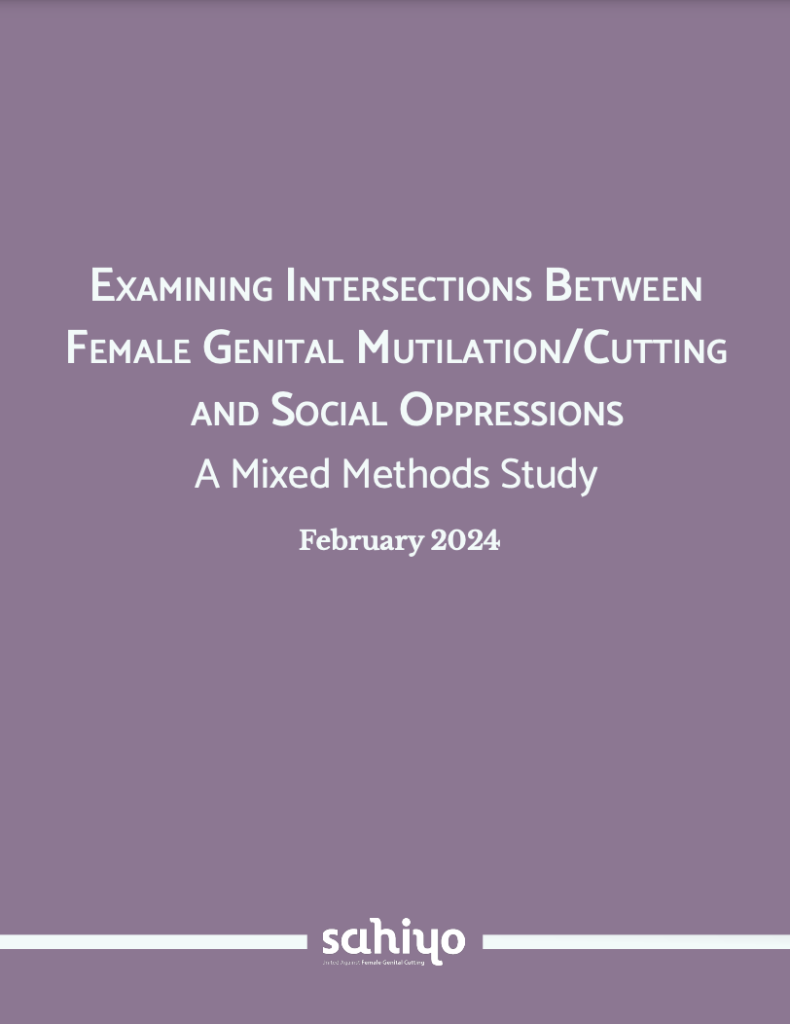
In April, Sahiyo’s research team gave two presentations exploring data from our advocate and survivor-led Critical Intersections Research Project, the latest report from this project having been released in February 2024. On April 23rd, Sahiyo presented Critical Intersections of FGM/C: The Value of Intersectionality in Cross-Collaboration in conjunction with API-GBV to attendees belonging to various gender-based violence organizations. This presentation fostered lively conversations around intersectionality and cross-collaboration, with one attendee asking about potential collaborations between the anti-FGM/C sphere and those working to end human trafficking. Overall, attendees reflected upon the interconnectedness of their various foci according to intersectionality. The second presentation, on April 24th, was in collaboration with the World Bank Group’s FGM Legal Working Group. Critical Intersections of FGM/C: Law and Policy in Systems of Oppression found attendees drawing on their current work, and how to interconnect to the issue of FGM/C. Concrete ideas emerged as to how to build cross-collaboration, including one participant emphasizing the simple action of referencing FGM/C in proposals to uplift the interconnection of the issue with other reproductive health and/or gender-based violence work. Our interactive presentations support organizations to engage in the following: To build holistic programs that identify intersectional needs of FGM/C survivors To identify components of building successful collaborations across organizations focused on different social oppressions (i.e. systemic racism and FGM/C) To compile tools, resources, case studies, and more that illustrate how cross-collaboration can be carried out within the larger social justice field If you and your organization would like to schedule a presentation or workshop, reach out to Rachel Wine at rachel@sahiyo.org. You can also learn more by visiting Sahiyo.org!
Sahiyo releases new research report on February 6th

Sahiyo U.S. is excited to announce the publication of Examining Intersections Between Female Genital Mutilation/Cutting And Social Oppressions: A Mixed Methods Study, the second of three reports from our Critical Intersections Research Project. Inspired by our 2021 webinar, and building upon themes derived from our initial body of work released in 2023, this new report is based on original research from a mixed-methods survey with over 100 respondents, including individuals and organization that work within and beyond the FGM/C sphere. We are proud to share this report on February 6th, International Day of Zero Tolerance for FGM/C, as part of our survivor and advocate-led original research project. The report examines two main forms of oppressions intersecting with FGM/C: systemic forces, including discrimination within institutions, as well as interpersonal and communcal factors, such as discrimination within practicing communities and the anti-FGM/C movement itself. This body of work also identifies challenges and opportunities for cross-collaboration with other social justice movements and provides recommendations for how to implement this intersectional work. This research is meant to support advocates working in FGM/C to better understand how these intersecting oppressions affect the movement to end FGM/C, and connect fellow activists and social change makers to understand the larger forms of inequity at play and unite in ending these universally oppressive systems. We aim to strengthen anti-FGM/C efforts by addressing the roots of inequity and inequality and to create stronger collaborative movements across various human rights issues. Read the report here. Learn more about the Critical Intersections Research Project here.
Sahiyo publishes second report from Critical Intersections Research Project

Sahiyo U.S. is excited to announce the publication of Examining Intersections Between Female Genital Mutilation/Cutting And Social Oppressions: A Mixed Methods Study, the second of three reports from our Critical Intersections Research Project. Inspired by our 2021 webinar, and building upon themes derived from our initial body of work released in 2023, this new report is based on original research from a mixed-methods survey with over 100 respondents, including individuals and organization working within and beyond the FGM/C sphere. We are proud to publish this report, as part of a survivor and advocate-led original research project, on February 6th, International Day of Zero Tolerance for FGM/C. The report examines two main forms of oppressions intersecting with FGM/C: Systemic forces, such as discrimination within systems and institutions, included intersections between several forms of oppression such as xenophobia and racism with institutions like law enforcement. Many survey participants identified fear of the criminal justice system as a challenge for survivors and the end FGM/C movement; interestingly, a majority of every group reported to work with the legal system and law enforcement (in and beyond the FGM/C sphere). Interpersonal and communal forces, such as discrimination from within practicing communities and the movement to end FGM/C, introduced complexities for survivors and activists alike. Interestingly, individuals working in the FGM/C sphere most commonly identified interpersonal challenges (rather than systemic forces) such as gender discrimination and other forms of gender-based violence as challenges that girls and women in FGM/C-practicing communities face. Additonally, a strong discord around the framing of FGM/C (‘mutilation’ vs. ‘cutting’) suggested a significant barrier to collaborating within the FGM/C sphere and beyond. Lastly, the study examined the potential for cross-collaboration between the anti-FGM/C sphere and other social justice movements. Though participants reported an overwhelming desire for cross-collaboration across the demographic groups, they also identified many significant challenges for meaningful cross-collaboration. Participants also provided opportunities for collaboration. From the various challenges, opportunities, and intersections of oppressions, eight recommendations for cross-sector collaboration and intersectional work involving how to work toward ending FGM/C were gathered. This research is meant to support advocates working in FGM/C to better understand how these intersecting oppressions affect the movement to end FGM/C, and connect fellow activists and social change makers to understand the larger forms of inequity at play and unite in ending these universally oppressive systems. We aim to strengthen anti-FGM/C efforts by addressing the roots of inequity and inequality and creating stronger collaborative movements across various human rights issues. A special thank you to the Wallace Global Fund for funding this project! Read the full report here.
PRESS RELEASE: Sahiyo publishes Examining the Current State of Critical Intersections: Female Genital Mutilation/Cutting and Social Oppressions report
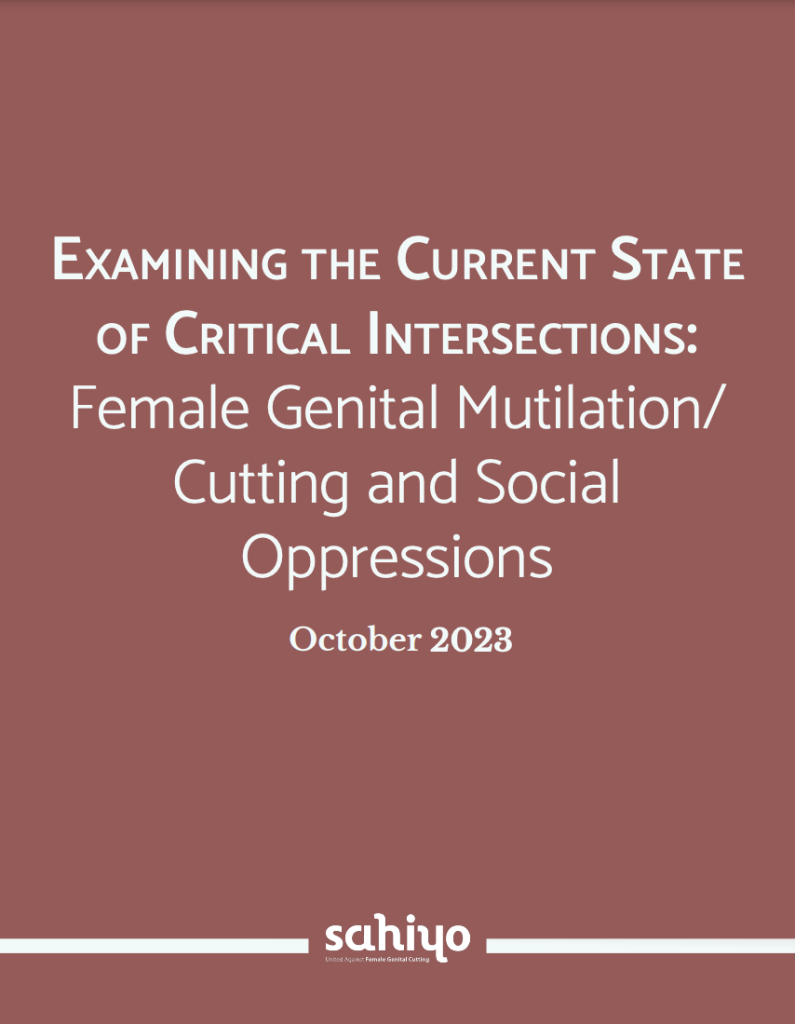
Sahiyo U.S. is proud to announce the publication of our new report, Examining the Current State of Critical Intersections: Female Genital Mutilation/Cutting and Social Oppressions. The report explores how different forms of oppression intersect to affect survivors’ access to resources, as well as how the work to end FGM/C is connected to other social justice movements. The inspiration for the report sprung from a webinar that Sahiyo U.S. hosted in July of 2021 titled, “Critical Intersections: Anti-Racism and Female Genital Mutilation/Cutting (FGM/C).” This discussion highlighted how systemic racism negatively affects the work to end FGM/C. The webinar was highly successful, engaging more than 300 people. Using that momentum, with funding from Wallace Global Fund, Sahiyo U.S. launched a research project to further understand how different forms of oppression affect marginalized communities that practice FGM/C, and how to connect with other social justice movements to strengthen efforts in ending FGM/C. The report breaks down how the following themes, and how they intersect with the harmful practice of FGM/C: Religion: FGM/C occurs within many different religious communities, yet a focus on Islamic communities falsely correlates the practice with this religion, negatively impacting women and survivors of FGM/C with an Islamic background and furtherheightening Islamaphobia. Race: common assumptions about FGM/C are often based on racist stereotypes. Type III FGM/C (infibulation) is often called “African FGM/C,” while less severe types of FGM/C such as Type I (clitoridectomy) and Type II (excision) are associated with Asian countries. This racialized distinction can be used to justify the practice by some FGM/C practicing communities Bodily Autonomy: there is great potential for collaboration between anti-FGM/C work and the #MeToo movement. Violations of survivors’ bodies at an age where they do not fully understand how their body functions inhibits their ability to assert bodily autonomy; similarly, survivors of the #MeToo movement lost autonomy over their bodies through experiences of sexual violation. Queer Gender and Sexuality: the practice of FGM/C itself forces survivors to comform to cisgender and heteronormative ideas of what a woman is. LGBTQ+ survivors are underrepresented in statistics and the FGM/C activist community, and face an intersection of barriers that causes erasure from the FGM/C sphere. Feminism: there are many complexities at the intersection of FGM/C and feminism. Both the resister and accommodator of FGM/C may argue that their actions are aligned with Feminist philosophy based on their reasoning. Law and Policy: In the U.S., state laws on FGM/C have been co-opted to ban gender-affirming healthcare for minors. Globally speaking, law and policy has led to the criminalization of FGM/C, creating opportunities for ending of the practice, or giving practitioners reason to continue it in secrecy. Climate Change: marginalized groups are more adversely affected by the climate crisis because they do not have economic resources to protect themselves. This puts financial strain on these communities, and makes women and girls more susceptible to oppression and violence, including FGM/C. It is our hope that this report will support advocates working in FGM/C to better understand how these intersecting oppressions affect the work to end FGM/C and survivors, and connect fellow activists and social change makers to unite in ending universally oppressive systems. Read the full report here. Learn more about the Critical Intersections Research Project.
The World Bank hosts webinar on the Intersectionality between Female Genital Mutilation/Cutting and Racism
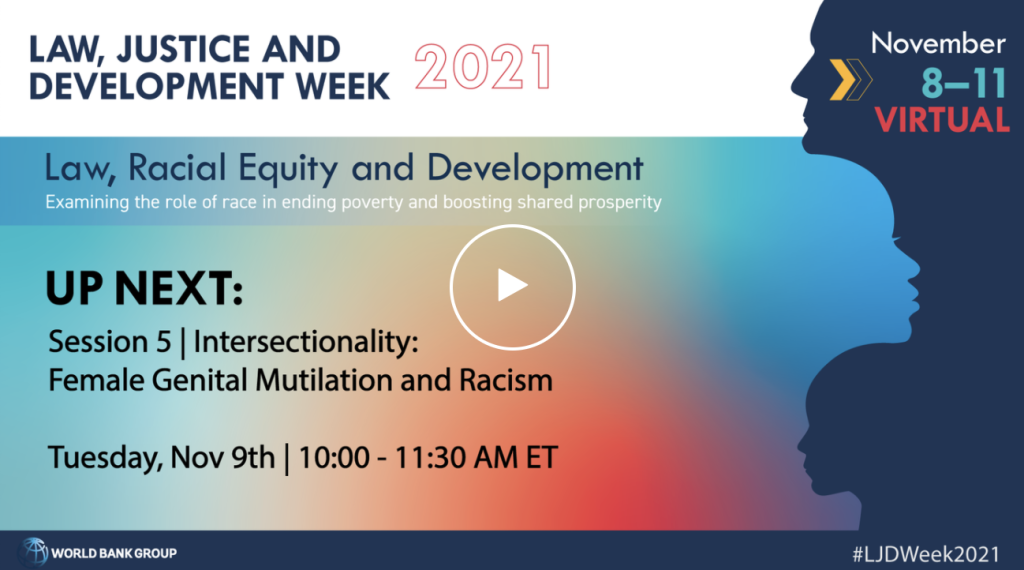
On November 9th, Sahiyo co-founder Mariya Taher participated as a speaker in the World Bank-hosted Webinar “Intersectionality: Female Genital Mutilation and Racism.” The webinar was an event of the GFLJD Female Genital Mutilation/Cutting Legal Working Group. The panel of speakers was composed of female genital mutilation/cutting (FGM/C) experts and activists from around the world, who explored the ways in which inherent underlying racism is preventing the effective protection of every women and girls while leaving no-one behind; the ways in which FGM and racism’s consequences on health, education, wellbeing, social and economic development are similar and cumulative; the idea that special laws criminalizing FGM/C are tinted with discrimination when every country already has applicable general laws on bodily harm, injuries, mutilation, VAWG and femicide; and the idea that development actors’ general reluctance to address FGM/C directly can to some extent result from a span of underlying racial and gender biases. In July of 2021, Sahiyo hosted a similar webinar: “Critical Intersections: Anti-Racism and Female Genital Mutilation/Cutting (FGM/C).” The event included thoughtful commentary from advocates and survivors of FGM/C on the overlap between racism, oppression, culture, and FGM/C. The speakers also shared the struggles theyhave faced while working to bring an end to this harmful practice globally. You can watch Sahiyo’s webinar here, and read the transcript of the webinar here.
Reflecting on the critical intersections between anti-racism and female genital cutting

By Sarah Boudreau In late July, Sahiyo held its webinar, Critical Intersections: Anti-Racism and Female Genital Mutilation/Cutting (FGM/C). Sahiyo U.S. Executive Director Mariya Taher moderated the panel discussion that included four expert speakers: Leyla Hussein, Aarefa Johari, Sunera Sadicali, and Aissata M.B. Camara. The event included thoughtful commentary on the overlap between racism, oppression, culture, and FGM/C, as well as the struggles the panelists have faced while working to spread awareness and bring an end to FGM/C. Hussein is an anti-FGM campaigner and a survivor who shares her personal experience of FGM/C with the goal of protecting girls from this abusive practice. Originally from Somalia, Hussein works as a psychotherapist in the United Kingdom and addresses the prevalence of FGM/C around the world. Johari is a journalist, feminist, and activist based in Mumbai, India. Johari is a senior reporter with Scroll.in, where she covers gender and labor. She has been speaking out against female genital cutting since 2012 and is one of the five original co-founders of Sahiyo. Sunera Sadicali grew up in a family that was a part of the Bohra Community; they were (and still are) the only Bohras in the Portugal/Iberic Peninsula. Sadicali is constantly trying to reconcile and find a balance between motherhood, art, her work as a family doctor, and political activism. Camara is a professional with over a decade of program development and management, strategic planning, and relationship-building experience in non-profit, local government, and international affairs. A social entrepreneur and advocate, she was featured in The Guardian, PBS, RFI, Deutshe Welle and Brut for her advocacy to end female genital mutilation/cutting. Camara is also a frequent speaker at conferences, including high-level events at the United Nations. The four panelists, who are survivors of FGM/C, answered questions about how FGM/C intersects with other forms of oppression, including racism, violence, and “othering.” They also discussed the lack of legislation and law enforcement surrounding the practice and challenges to passing laws to protect girls at risk. One notable part of the discussion occurred when Hussein made the point that survivors can become gatekeepers and have the opportunity to change the way that they are perceived. She relayed that when people hear about FGM/C, they may dismiss it and attribute it to cultural practice, but by naming FGM/C as child abuse rooted in patriarchy and oppression, survivors can draw attention to the issue for what it is in order to truly show people the harm being done. Toward the end of the webinar, Camara discussed other movements such as Me Too and Black Lives Matter and how allyships must be formed in order to generate more traction in the media to spread FGM/C awareness. By teaming up with other survivors, resources, officials, and organizations, more conversations about FGM/C can lead to change. In conclusion, the Critical Intersections webinar allowed panelists from diverse backgrounds to share their views on racism and FGMC. Several ideas were brought up about how to spark change and dialogue in both local communities and globally. But the common thread among all the speakers was that change is not always easy, but always worth fighting for. For the sake of women and girls everywhere, the future holds hope for justice, healing, and change. [youtube url=”https://www.youtube.com/watch?v=CUK438sfyQg”] Read the webinar transcript.
Addressing Critical Intersections: Anti-Racism and Female Genital Cutting
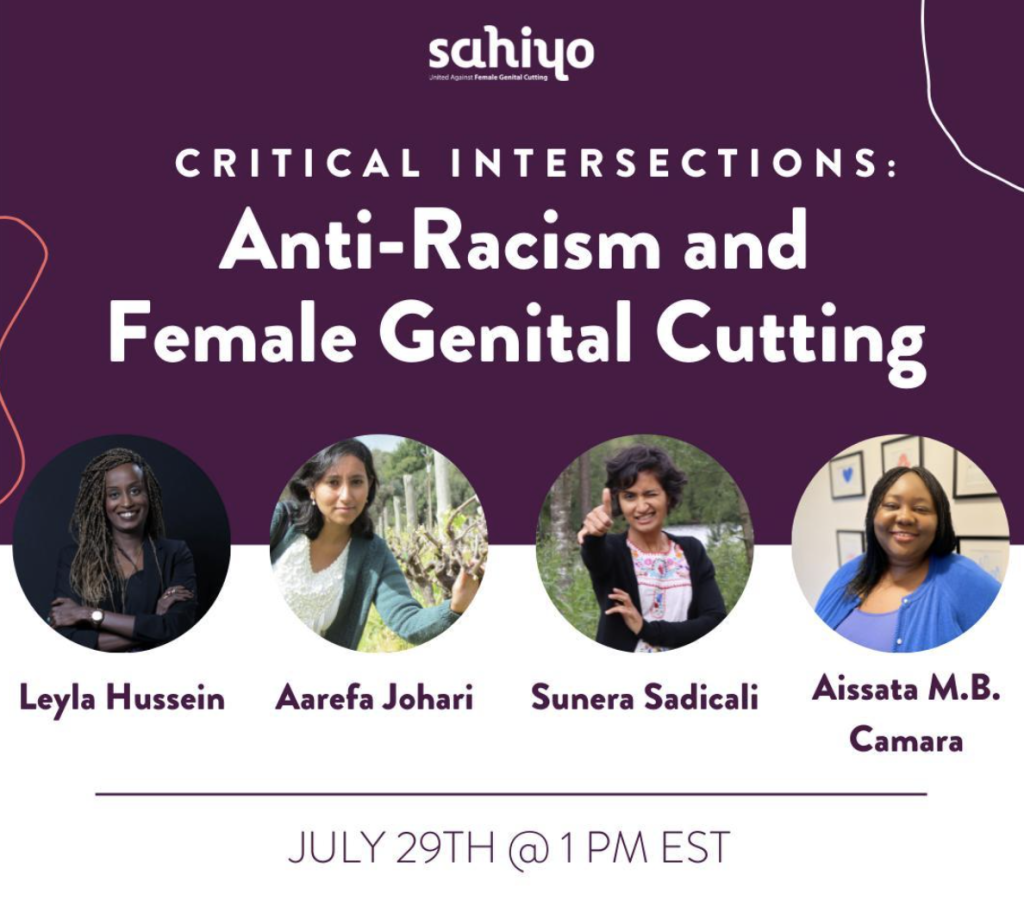
Although female genital cutting (FGC) is not limited to any one community, misconceptions rooted in racism, Islamophobia, and xenophobia have still negatively impacted the movement to end FGC – as well as survivors themselves. In our work to end FGC, we must use an intersectional approach to support the needs of all women impacted by FGC and bring about substantial change. First coined in 1989 by professor Kimberlé Williams Crenshaw, the term intersectionality was created to help us understand “the interconnected nature of social categorizations such as race, class, and gender as they apply to a given individual or group, regarded as creating overlapping and interdependent systems of discrimination or disadvantage.” An intersectional approach to all social movements is crucial to address the intersecting oppressions that impact different communities. On July 29th at 1 pm EST Sahiyo will be hosting the webinar, “Critical Intersections: Anti-Racism and Female Genital Cutting.” This webinar will explore the intersection of anti-racism work and the work to end FGC. Four expert speakers, including Leyla Hussein, Aarefa Johari, Aissata Camara, and Sunera Sadicali, will explore intersectionality and FGC in a panel moderated by Sahiyo U.S. Executive Director Mariya Taher. These renowned activists have worked in the field of FGC prevention and survivor support, exploring the critical intersections where this form of gender-based violence meets systemic racism. Our guest speakers’ experiences will expand the conversation on how FGC survivors and advocates for change often have to push back against racist narratives in their work and in their journey toward healing, as well as how systemic racism can delay substantial change on this issue. During this webinar, you’ll be able to be a part of the discussion about how we can all become better educated and better advocates in the journey to end systemic racism and FGC. This event is open to anyone who wishes to attend. Register Today: https://bit.ly/CriticalIntersectionsWebinar Leyla Hussein is an anti-FGM campaigner and a survivor who shares her personal experience of FGM with the goal of protecting girls from this abusive practice. Originally from Somalia, Leyla works as a psychotherapist in the United Kingdom and addresses the prevalence of FGM around the world. As Leyla reminds us, FGM is a practice of oppressing women and controlling women’s sexuality. It’s not an African issue, it’s not an Asian issue; it’s a global issue that requires a global investment in women. Aarefa Johari is a journalist, feminist and activist based in Mumbai, India. Aarefa is a senior reporter with Scroll.in, where she covers gender and labour. She has been speaking out against female genital cutting since 2012 and is one of the five original co-founders of Sahiyo. Sahiyo is an organization founded on the belief that storytelling in all forms can create positive social change and help empower communities to abandon the practice of FGC. Sunera Sadicali was born in 1982 in Mozambique and moved to Lisbon when she was 2 years old. She grew up in a family that was a part of the Bohra Community; they were (and still are) the only Bohras in the Portugal/Iberic Peninsula. Sunera underwent khatna (FGM Type I) by age of 8 in Pakistan while visiting her grandparents on vacation. She moved to Spain to study medicine by the age of 19 and finished her Family Medicine residency in Madrid. She has been politically active since the birth of her second child in 2012 in women’s issues, decolonial feminism, anti-racism and healthcare activism. Sunera is constantly trying to reconcile and find a balance between motherhood, art, her work as a family doctor, and political activism. Aissata M.B. Camara is a professional with over a decade of program development and management, strategic planning, and relationship-building experience in non-profit, local government, and international affairs. A social entrepreneur and advocate, she was featured in The Guardian, PBS, RFI, Deutshe Welle and Brut for her advocacy to end female genital mutilation/cutting. She has received numerous awards, including the New York State Assembly Certificate of Merit, Knights of Pythias Medal of Achievement, the Hackett Medal for Oratory Excellence, and the Jo Ivey Boufford Award. Aissata is also a frequent speaker at conferences, including high-level events at the United Nations.
Sahiyo stands with AAPI communities experiencing racist violence
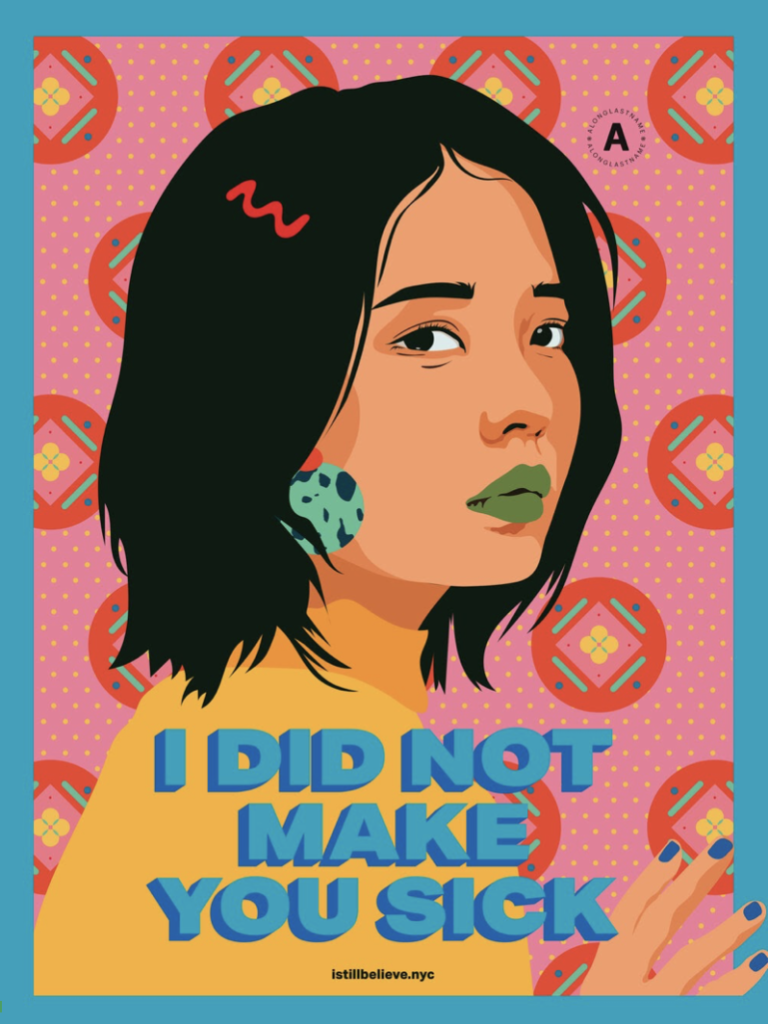
Sahiyo stands in solidarity with Asian communities and individuals who have been experiencing racism and hate crimes. We are an organization born from working with and supporting Asian communities. This violence concerns everyone and is of utmost importance to us, due to our proximity and connection to these communities. Sahiyo condemns the recent violence and rhetoric, along with the othering and oppressions Asians have faced in the United States since arriving. Over the course of the coronavirus pandemic, there has been a surge of hateful rhetoric and racist violence against the AAPI (Asian American/Pacific Islander) communities in the United States. By mid-March, the Stop AAPI Hate National Report logged over 3800 violent attacks toward Asian Americans, mostly women (68%). Attacks also targeted elderly people, and this abuse is unacceptable but unfortunately, not new, as evidenced here and here. The United States has a long history of oppressing and dehumanizing Asian Americans, from Chinese indentured labor to Japanese internment camps to the fetishization and Orientalism Asian women experience. This thoughtful opinion piece explains racism toward Asians in the United States, and what it says about our country. Take a moment to educate yourself about current and past harmful tropes forced on Asians and the context of anti-Asian racism in this country. This toolkit, as well as this one, aim to equip us all with the education and resources we need to Stop Asian Hate. It is also key to recognize this racialized othering for what it is–twisted with misogyny and leaving women concerned for their public safety. The racist attacks in Georgia, as well as other recent violent moments are filled with racism, but also sexism. Asian women find themselves in the frightening crosshairs of both forms of oppression. Thankfully, there are resources meant to support and protect Asian women. You can also check out powerful zine, Asian American Feminist Antibodies {care in the time of coronavirus}, a collaboration between the Asian American Feminist Collective and Bluestockings Bookstore, to hear Asian feminist voices speaking out. Trauma is inherited, and the suffering of some in the AAPI community can take a toll on all members. If you are struggling, check out this site focusing on AAPI mental health resources. What can you do? Call out ignorant jokes, hateful or micro-aggressive comments when you hear them. Learn how to interfere when you witness Asian-hate. This link contains a variety of options to register for Bystander Intervention to Stop Anti-Asian/American Harassment and Xenophobia workshops and training. Report any hate incidences you encounter here. Visit your local AAPI businesses. Restaurants, shops and other establishments have been hit economically in this wave of racism, so you can put your money into these businesses to support them and let them know they are valued and wanted in your community. Donate. Cover image credit: One of Amanda Phingbodhipakkiya’s panels for the “I Still Believe in Our City” public art series.
